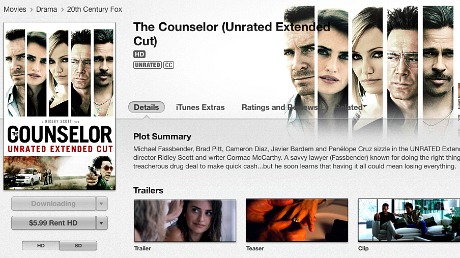The extended-cut Bluray of Ridley Scott‘s The Counselor (138 minutes vs. the 118-minute theatrical version) streets today. I’ve rented it on iTunes for viewing this evening. In the view of Forbes.com’s Mark Hughes, the theatrical version was over-abbreviated but the long version allows the characters to breathe easier and and stretch their legs and fill things out. If this view turns out to be widely shared, people will call it a repeat of the extended Bluray cut of Scott’s Kingdom of Heaven — a significantly better version than what was shown in theatres.

The longer Counselor “provides a level of insight into Scott’s artistic vision and career that I failed to notice the first time I saw the film,” Hughes writes. For the longer cut is basically about “Scott fully embracing the story and just going about bringing this tale to life without concern or consideration for length or commercial business needs, and then having to look back over what he’s created and reshape it to contain as much of his artistic needs as possible but packaged in a way that addresses likely mistaken impressions such as ‘this is slow, that’s slow.’
“Listen to Scott’s voice as he recites those points in the commentary, hear the almost weariness in his recognition that so often art and themes and messages get necessarily reduced for easier consumption by those who go through the world with a stopwatch and a short attention span.
“Characters need time. They need to speak, to think, to interact, without external artificial pressure to conform to limitations. And that’s what it boils down to in the end — the limiting of characters and their lives. Some stories and some characters just need however much time they need in order to be fully realized, and to work together in the best way to tell their stories. I realize now, in a way I never have before, that Scott is often drawn to stories that revolve around characters in situations reflecting and tearing down their perceptions of themselves, their lives, and their realities. And the more he avoids trying to make those stories conform to limitations on their essence, the better the films are.
“The extended version of the film is frankly the movie I wish I’d seen the first time. From the opening moments that take us from an entirely non-contextual lingering view of a motorcycle rider in the desert to a similarly initially non-contextual lingering sequence of lovers under a floating, rolling bed sheet, the tonal dissonance I felt in the theater gives way to a slower movement between the two views of the world.”
